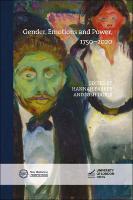Gender, Emotions and Power, 1750–2020
Contributor(s)
Parker, Hannah (editor)
Doble, Josh (editor)
Collection
Knowledge Unlatched (KU)Language
EnglishAbstract
This collection of essays constitutes a timely intervention into contemporary debates on emotions, gender, race and power. Interrogating how emotional expectations are established as gendered, racialised and class-based notions, the volume explores the ways these expectations have been generated, stratified and maintained by institutions, societies, media and those with access to power.The collection draws upon a diverse set of case studies to present a chronologically and geographically broad intervention. The authors identify and explore connections between the depiction of twentieth-century transnational feminists, settler colonies in southern Africa, post-unification Italy, Maoist China, the twentieth-century Soviet Union and the medicalized spaces of the British Raj. Contributions also move across time from notions of eighteenth-century British masculinity, through Victorian Britain and whiteness in settler colonialism, to the Liverpool docks of the 1990s and contemporary Russia. Collectively, the volume’s authors seek to understand how the normalisation of emotions as a range of gendered qualities forms the basis upon which notions of self, and connectedly, social identities are performed. As such, this is an important contribution to the history of emotions that addresses how gender and emotions are formed as co-constituents within dominant power structures, in different geographic and temporal spaces.


 Download
Download